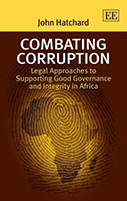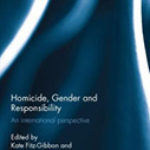Combating Corruption: Legal Approaches to Supporting Good Governance and Integrity in Africa

Author: John Hatchard
Publisher: Cheltenham, UK; Northampton, MA: Edward Elgar, 2014. 416p.
Reviewer: Michael Johnston | January 2015
Few if any societies in the world have suffered more from corruption, in its various forms, than have those of Africa. Few have benefited—and suffered—more from the attention of international development and reform efforts. Much of that attention has dealt with corruption issues, directly or indirectly, and yet after a quarter-century of effort country-level anti-corruption success stories are scarce—as is the case more or less everywhere else.
Still, the prospects for sustained anti-corruption reform in Africa may be improving. The region has seen a number of welcome democratic trends; in no way does democracy eradicate corruption (far from it), but without it accountability will be weak to nonexistent. Economic trends are positive, to varying degrees, in a number of societies, and some are seeing the signs of an emerging middle class. In several states citizens are more willing to bring their problems into the political and official arenas, or at least to consider doing so, rather than trusting “fixers” to get the job done. Many of those who govern are taking both their own and citizens’ responsibilities more seriously. African states have signed on to the United Nations Convention against Corruption, and corruption issues are on the agenda of the African Union, which itself is showing increased organizational vitality.
The time is right, therefore, for a fresh look at anti-corruption approaches in Africa, and John Hatchard’s book offers an exhaustive and authoritative tour of one of the most important among them: laws, institutions, and the ways they can improve the quality of government. The discussion revolves around three main propositions: that laws and institutions are the foundations of reform; that “the art of persuasion is fundamental to developing the necessary political will to make the legal strategies ‘work’”; and that good governance and reform are global responsibilities, not just African issues.
Twelve chapters, backed up by an extensive information base of legal cases and broader examples of corruption itself, examine legal and institutional frameworks from just about every conceivable angle: the practices the law should target, what laws should be enacted to those ends, how laws can deprive perpetrators of the proceeds of corrupt dealings; investigation, prosecution, prevention, and national anti-corruption bodies; the courts, judiciaries, the role of the private sector; reconciling vigorous anti-corruption action with constitutional rights and guarantees; and more. Scholars, officials, and activists concerned with the broad prospects for checking corruption through law enforcement and the courts will find a wealth of essential knowledge and supporting cases in Hatchard’s book.
Therein lie both the strengths and the weaknesses of the book. Its exploration of “legal approaches to supporting good governance,” as the subtitle puts it, is admirable in both depth and detail. But what is missing is context. Variations in broad types of corruption problems are not discussed, nor are their connections to states and trends in economic and political development. Civil society and the press receive only occasional discussion. Linkages between corruption and citizens’ quality-of-life problems—a critical connection if the collective-action dilemmas inherent in mobilizing public support for reform are to be overcome—do not figure into the analysis. Ways of assessing the effects of reform, and of the progress (or lack of it) made by the reform movement generally, are not examined. No book on corruption or reform can cover all the bases, to be sure. But a critical question remains: even if we assume the best possible legal frameworks and institutional configurations, how can reformers ensure that they will be put to use?
Hatchard does address that issue, but in a way that at least some readers will find unsatisfying. As the second main point above reflects, he places crucial emphasis upon political will, and ways of sustaining it. “Political will” is a commonplace term in discussions of reform, and for many people it is a clincher of sorts; find and support leaders and officials who have made up their minds to do their jobs and live within the law, and good things can happen. But in a way that comes perilously close to saying that in order to control corruption we have to control corruption. Hatchard’s recommendations for sustaining political will—various forms of “persuasion”—would themselves require, well, political will.
In fact “political will,” when it comes to reform in real societies, is an empty concept. Fundamentally the phrase refers to intentions or dispositions whose existence cannot be verified independently of the consequences they are supposed to cause. Worse yet, that approach to reform leaves corruption control excessively dependent upon a few anti-corruption champions. Lee Kwan Yew may live forever, it seems, but most such champions come and go: Ronald Maclean’s corruption-control successes as Mayor of La Paz did not, for the most part, carry forward into the municipal administrations of his successors. A look at the historical processes through which a number of badly governed countries eventually began to check abuses of power and wealth (consider the United Kingdom, the United States, or Sweden, as examples) suggests that reform drew critical strength from society as a whole—from citizens’ own efforts to defend and assert their rights and interests. Such processes are politically contentious and are often driven by interests and agendas that would strike many as narrow and self-serving, but they also help draw important limits around official conduct, and build linkages of accountability—arrangements that prove durable because they serve the lasting interests of significant numbers of real people. In time such limits and linkages in society help foster social values and expectations that deter official misconduct in ways that are diffuse, yet often broadly legitimate. Lest this account of reform seem fanciful, Botswana—a case of imperfect governance to be sure, yet in many ways a success story in terms of development and corruption control—offers a range of useful lessons, but receives only brief discussion in this book.
Hatchard deserves real credit for a number of strengths in the book, beginning with the scope and detail of his exploration of legal and institutional issues. Similarly, he gives a useful account of the evolution of constitutional frameworks across the continent, and shows that the governance situations of numerous societies are evolving in critical ways. He stays away from facile arguments based on the legacies of colonialism, and from sweeping claims about “culture.” Most important, he takes the African state, and its legal and institutional elements, seriously.
But does he take African politics sufficiently seriously? After all, the legal and institutional frameworks he advocates—and to which few will object—were not the starting point from which once corrupt societies launched a quest for reform. They were, instead, the outcomes of long processes of political and social contention, and in both form and function they depend critically upon the energy derived from real interests in society. Those forces are at work in African societies too, and their support will be essential if even the best-designed controls are to be effective. Sound legislation and good enforcement must be accompanied by—indeed, will often depend upon—a contentious political process of deciding who is to govern society, on the basis of what mandates, and subject to what limits and mechanisms of accountability. That sort of political process will never eradicate all corruption, and it is never fully finished. But understanding and supporting it is a critical challenge to reformers, not just in Africa but (as Hatchard would likely agree) around the globe.
Michael Johnston – Charles A. Dana Professor of Political Science, Colgate University,
mjohnston@colgate.edu


